Fleurs du Mal Magazine


Or see the index
A timely and passionate call to action for engaging with our current political moment, from the Grammy-nominated and multiplatinum singer-songwriter and New York Times bestselling author Tori Amos.
 Since the release of her first, career-defining solo album Little Earthquakes, Tori Amos has been one of the music industry’s most enduring and ingenious artists. From her unnerving depiction of sexual assault in “Me and a Gun” to her post-September 11 album, Scarlet’s Walk, to her latest album, Native Invader, her work has never shied away from intermingling the personal with the political.
Since the release of her first, career-defining solo album Little Earthquakes, Tori Amos has been one of the music industry’s most enduring and ingenious artists. From her unnerving depiction of sexual assault in “Me and a Gun” to her post-September 11 album, Scarlet’s Walk, to her latest album, Native Invader, her work has never shied away from intermingling the personal with the political.
Amos began playing piano as a teenager for the politically powerful at hotel bars in Washington, DC, during the formative years of the post-Goldwater and then Koch-led Libertarian and Reaganite movements. The story continues to her time as a hungry artist in Los Angeles to the subsequent three decades of her formidable music career. Amos explains how she managed to create meaningful, politically resonant work against patriarchal power structures–and how her proud declarations of feminism and her fight for the marginalized always proved to be her guiding light. She teaches us to engage with intention in this tumultuous global climate and speaks directly to supporters of #MeToo and #TimesUp, as well as young people fighting for their rights and visibility in the world.
Filled with compassionate guidance and actionable advice–and using some of the most powerful, political songs in Amos’s canon–this book is for anyone determined to steer the world back in the right direction.
Tori Amos is a Grammy-nominated singer-songwriter, pianist, composer, and, with Ann Powers, the New York Times bestselling author of Tori Amos: Piece by Piece. She has released fifteen studio albums, including her latest, Native Invader, in 2017.
Tori Amos
Resistance: A Songwriter’s Story
of Hope, Change, and Courage
Publisher: Atria Books
Date: May 05, 2020 !
Pages: 272
Hardcover
ISBN-10: 1982104155
ISBN-13: 978-1982104153
Publisher: Atria Books (May 5, 2020)
Language: English
Publishing date: May 5, 2020
Price: $23.40
• fleursdumal.nl magazine
More in: # Music Archive, - Book News, - Book Stories, Archive A-B, Archive A-B, Art & Literature News
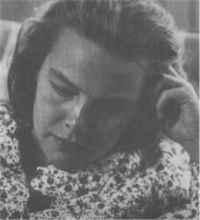
Even the gulls of the cool Atlantic
Even the gulls of the cool Atlantic retip the silver foam,
The boats that warn me of the fog warn me of their motion
I have looked for my childhood among pebbles my home
Within the lean cupboards of motherhubbard and clipped Albion
A wind whose freshness blows over the Cape to me
Has made me laugh at the memory of a friend whose hair is blond
Still we laugh and run our hands over the sea
From the farthest tip of land to the end of the end.
I had so often run down to these shores to stare out
If I took an island for a lover and Atlantic for my sheet
There was no one to tell me that loving across distance would turn about
And make the here and now an elsewhere of defeat.
In my twenty first year to have the grubby hand of a slums
Be the small child at my knee knee the glistening chalk
That sails to meet the stationary boat the water sloping as it comes
And all the Devon coast of grey and abrupt rock
By gazing across water I have flicked many gulls from my eyes
Shuffled small shells and green crabs at my feet
The day is cool the sun bright the piper cries
Shrilly tampering the untouched sand with delicate conceit.
Up beyond the height and over the bank I have a friend
How are your winter days and summer actions
There could be little more than a tea cup hour to make us comprehend
A mature man’s simplicity or grave child’s sweet reaction.
Joan Murray
(1917-1942)
Even the gulls of the cool Atlantic
(poem)
• fleursdumal.nl magazine
More in: Archive M-N, Archive M-N, Joan Murray, Natural history
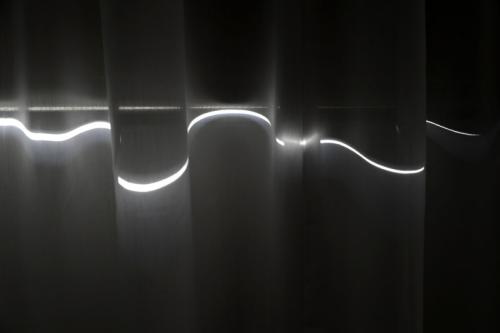
Geheim
Verbazingwekkend scherp gelijke tred
met de herinnering. Halsstarrig bedenken
van ballades omtrent niets. Opgestaan
zijn wij uit een lege slaap, en we eten nu
brood aan langzame, langzame tafels.
Prevel maar voor een gesloten gordijn.
Traagheid is immers van geluk het geheim.
Bert Bevers
Joep Eijkens maakte de foto bij dit gedicht
© gedicht Bert Bevers 2020
© foto Joep Eijkens 2020
• fleursdumal.nl magazine
More in: Archive A-B, Archive E-F, Bevers & Eijkens, Bevers, Bert, Joep Eijkens Photos, Photography
In ‘Zij namen het woord’ schetst Margot Dijkgraaf de portretten van uitzonderlijke, schrijvende Franse vrouwen uit de 17e tot de 21e eeuw.
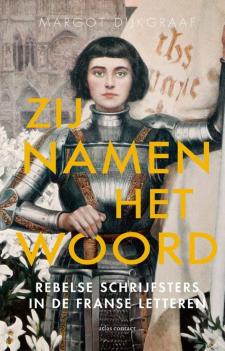 Ze schrijven, ze spreken, ze gaan de barricaden op, ze doorbreken taboes, ze verleggen grenzen. En ze bieden inspiratie – door hun boeken, hun denkbeelden, hun daden of hun karakter.
Ze schrijven, ze spreken, ze gaan de barricaden op, ze doorbreken taboes, ze verleggen grenzen. En ze bieden inspiratie – door hun boeken, hun denkbeelden, hun daden of hun karakter.
De vrouwen in dit boek heten Colette of Françoise Sagan, George Sand of Simone de Beauvoir, Madame de Staël of Maryse Condé.
De een is grondlegger van de Europese literatuur, de volgende vecht voor de positie van de vrouw als schrijfster, weer een ander richt haar pijlen op onrechtvaardigheid en ongelijkheid of eist voor de niet-westerse stem een plek op in de literatuur.
Allemaal zijn ze Franstalig, rebels, tegendraads. Schrijven is gevaarlijk.
Margot Dijkgraaf
Zij namen het woord
Pagina’s: 240
Paperback / softback
Gepubliceerd: februari 2020
ISBN 9789045040998
Uitg. Atlas-Contact
€ 19,99
# new books
Margot Dijkgraaf
Zij namen het woord
• fleursdumal.nl magazine
More in: - Book News, - Book Stories, - Bookstores, Archive C-D, Art & Literature News, Margot Dijkgraaf, NONFICTION: ESSAYS & STORIES, The Ideal Woman
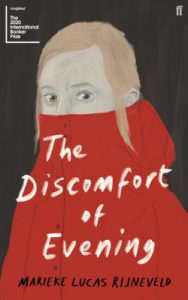 The International Booker Prize is awarded annually for a single book, translated into English and published in the UK or Ireland.
The International Booker Prize is awarded annually for a single book, translated into English and published in the UK or Ireland.
The vital work of translators is celebrated, with the prize money divided equally between the author and translator.
The judges of the 2020 International Booker Prize have revealed the six shortlisted books of the International Booker Prize which celebrates the finest translated fiction from around the world.
The 2020 International Booker Prize shortlist is as follows:
◊ The Enlightenment of the Greengage Tree by Shokoofeh Azar (Farsi-Iran), translated by Anonymous, published by Europa Editions
◊ The Adventures of China Iron by Gabriela Cabezón Cámara (Spanish-Argentina), translated by Iona Macintyre and Fiona Mackintosh, published by Charco Press
◊ Tyll by Daniel Kehlmann (Germany-German), translated by Ross Benjamin, published by Quercus
◊ Hurricane Season by Fernanda Melchor (Spanish-Mexico), translated by Sophie Hughes, Published by Fitzcarraldo Editions
◊ The Memory Police by Yoko Ogawa (Japanese-Japan), translated by Stephen Snyder, published by Harvill Secker
◊ The Discomfort of Evening by Marieke Lucas Rijneveld (Dutch-Netherlands), translated by Michele Hutchison, published by Faber & Faber
The shortlist was chosen by a panel of five judges, chaired by Ted Hodgkinson, Head of Literature and Spoken Word at Southbank Centre. The panel also includes: Lucie Campos, director of the Villa Gillet, France’s centre for international writing; Man Booker International Prize-winning translator and writer Jennifer Croft; Booker Prize longlisted author Valeria Luiselli and writer, poet and musician Jeet Thayil, whose novel Narcopolis was shortlisted for the Man Booker Prize in 2012.
◊ The Winner will be announced on 19 may 2020
# More information on website Booker Prize
• fleursdumal.nl magazine
More in: - Book Lovers, - Book News, Archive Q-R, Archive Q-R, Awards & Prizes, Rijneveld, Marieke Lucas, TRANSLATION ARCHIVE

A Requiem
For Soldiers lost in Ocean Transports
When, after storms that woodlands rue,
To valleys comes atoning dawn,
The robins blithe their orchard-sports renew;
And meadow-larks, no more withdrawn
Caroling fly in the languid blue;
The while, from many a hid recess,
Alert to partake the blessedness,
The pouring mites their airy dance pursue.
So, after ocean’s ghastly gales,
When laughing light of hoyden morning
breaks,
Every finny hider wakes–
From vaults profound swims up with
glittering scales;
Through the delightsome sea he sails,
With shoals of shining tiny things
Frolic on every wave that flings
Against the prow its showery spray;
All creatures joying in the morn,
Save them forever from joyance torn,
Whose bark was lost where now the
dolphins play;
Save them that by the fabled shore,
Down the pale stream are washed away,
Far to the reef of bones are borne;
And never revisits them the light,
Nor sight of long-sought land and pilot more;
Nor heed they now the lone bird’s flight
Round the lone spar where mid-sea surges
pour.
Herman Melville
(1819 – 1891)
A Requiem
For Soldiers lost in Ocean Transports
•fleursdumal.nl magazine
More in: Archive M-N, Archive M-N, Herman Melville, WAR & PEACE
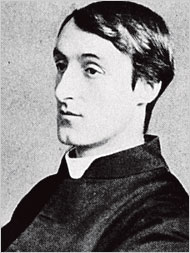
Nightfall
The times are nightfall, look, their light grows less;
The times are winter, watch, a world undone:
They waste, they wither worse; they as they run
Or bring more or more blazon man’s distress.
And I not help. Nor word now of success:
All is from wreck, here, there, to rescue one –
Work which to see scarce so much as begun
Makes welcome death, does dear forgetfulness.
Or what is else? There is your world within.
There rid the dragons, root out there the sin.
Your will is law in that small commonweal . . .
Gerard Manley Hopkins
(1844 – 1889)
Nightfall
• fleursdumal.nl magazine
More in: Archive G-H, Archive G-H, CLASSIC POETRY, Hopkins, Gerard Manley
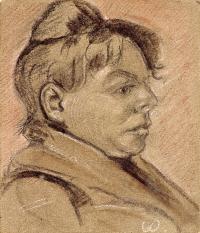
De eer.
t Is een
kanon.
‘t Is een
geweer….
Men schiet.
Men moordt:
Maar ‘t is
voor d’eer!
Men steekt
elkaar
een mes
in ‘t hart,
En zie
zoo’n daad
is wit,
niet zwart.
Want ‘t is
voor d’eer!
Men steelt.
Men brandt.
En zie
‘t is goed,
want ‘t is
voor ‘t land!
Vervloekt
die eer!
Vervloekt
dat land!
Vervloekt
de mensch!
Vervloekt
de hand,
die grijpt
naar ‘t zwaard,
die grijpt
naar d’eer,
die grijpt
in bloed.
Steeds meer.
Steeds weer.
Weg met
die eer!
Z’is voos!
Z’is rot!
Wat maakt
zij van
den mensch?
Een zot!
Agnita Feis
(1881 – 1944)
Uit: Oorlog. Verzen in Staccato (1916).
De eer
• fleursdumal.nl magazine
More in: *War Poetry Archive, Agnita Feis, Antony Kok, Archive E-F, De Stijl, Doesburg, Theo van, Feis, Agnita, Theo van Doesburg, Theo van Doesburg (I.K. Bonset), WAR & PEACE
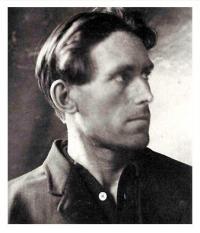
Last Will
My will is easy to decide,
For there is nothing to divide.
My kind don’t need to fuss and moan —
“Moss does not cling to a rolling stone.”
My body? Ah, If I could choose,
I would to ashes it reduce,
And let the merry breezes blow
My dust to where some flowers grow.
Perhaps some fading flower then
Would come to life and bloom again.
This is my last and final will.
Good luck to all of you.
Joe Hill
(1879-1915)
Last Will
Written in his cell on the eve of his execution
Joe Hill was sentenced to death after being accused of the murder of two shopkeepers. His conviction is often disputed by historians. On November 18, 1915, one day before his execution, he wrote his last will. On that same day, he sent a telegram to fellow IWW member Bill Haywood, telling him: “Don’t waste time mourning – Organize!”
• fleursdumal.nl magazine
More in: # Music Archive, - Archive Tombeau de la jeunesse, Archive G-H, Archive G-H, In Memoriam, Joe Hill
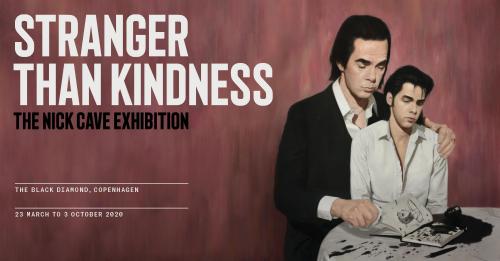
Stranger Than Kindness is a journey in images and words into the creative world of musician, storyteller and cultural icon Nick Cave.
This highly collectable book invites the reader into the innermost core of the creative process and paves the way for an entirely new and intimate meeting with the artist, presenting Cave’s life, work and inspiration and exploring his many real and imagined universes. It features full colour reproductions of original artwork, handwritten lyrics, photographs and collected personal artefacts along with commentary and meditations from Nick Cave, Janine Barrand and Darcey Steinke.
Stranger Than Kindness asks what shapes our lives and makes us who we are, and celebrates the curiosity and power of the creative spirit.
The book has been developed and curated by Nick Cave in collaboration with Christina Back. The images were selected from ‘Stranger Than Kindness: The Nick Cave Exhibition’, opening at the Royal Danish Library in Copenhagen in March 2020.
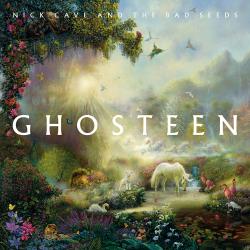 Nick Cave has been performing music for more than thirty years and is best known as the songwriter and lead singer of Nick Cave & The Bad Seeds, whose latest album Ghosteen was widely received as their best work ever. Cave’s body of work also covers a wider range of media and modes of expression including film score composition and writing of novels. His recent Conversations events and Red Hand Files website have seen Cave exploring deeper and more direct relationships with his fans.
Nick Cave has been performing music for more than thirty years and is best known as the songwriter and lead singer of Nick Cave & The Bad Seeds, whose latest album Ghosteen was widely received as their best work ever. Cave’s body of work also covers a wider range of media and modes of expression including film score composition and writing of novels. His recent Conversations events and Red Hand Files website have seen Cave exploring deeper and more direct relationships with his fans.
Stranger Than Kindness: The Nick Cave Exhibition
A journey into the creative world of musician, storyteller and cultural icon Nick Cave.
23 March 2020 – 3 October 2020
Exhibition in the Black Diamond Copenhagen
Stranger Than Kindness: The Nick Cave Exhibition
The Black Diamond – Royal Danish Library
Søren Kierkegaards Plads, Copenhagen, Denmark
Please check our website for a new opening date:
www.thenickcaveexhibition.com
The exhibition was developed and designed by Christina Back, Royal Danish Library and Janine Barrand, Arts Centre Melbourne in collaboration with Nick Cave for The Black Diamond, Copenhagen. It was curated and produced by Royal Danish Library in collaboration with the Australian Music Vault at Arts Centre Melbourne. The soundscapes were composed and recorded for the exhibition by Nick Cave and Warren Ellis.
 The book: Stranger Than Kindness is a journey in images and words into the creative world of musician, storyteller and cultural icon Nick Cave.
The book: Stranger Than Kindness is a journey in images and words into the creative world of musician, storyteller and cultural icon Nick Cave.
This highly collectable book invites the reader into the innermost core of the creative process and paves the way for an entirely new and intimate meeting with the artist, presenting Cave’s life, work and inspiration and exploring his many real and imagined universes.
Nick Cave
Stranger Than Kindness
Hardcover: 276 pages
Publisher: Canongate Books;
Main edition (23 Mar. 2020)
Language: English
ISBN-10: 1838852247
ISBN-13: 978-1838852245
Product Dimensions: 22 x 3 x 29 cm
£35.00
https://canongate.co.uk/
• fleursdumal.nl magazine
More in: # Music Archive, - Book News, - Bookstores, Archive C-D, Nick Cave, THEATRE

Brod und Wein
An Heinze
1
Rings um ruhet die Stadt; still wird die erleuchtete Gasse,
Und, mit Fakeln geschmükt, rauschen die Wagen hinweg.
Satt gehn heim von Freuden des Tags zu ruhen die Menschen,
Und Gewinn und Verlust wäget ein sinniges Haupt
Wohlzufrieden zu Haus; leer steht von Trauben und Blumen,
Und von Werken der Hand ruht der geschäfftige Markt.
Aber das Saitenspiel tönt fern aus Gärten; vieleicht, daß
Dort ein Liebendes spielt oder ein einsamer Mann
Ferner Freunde gedenkt und der Jugendzeit; und die Brunnen
Immerquillend und frisch rauschen an duftendem Beet.
Still in dämmriger Luft ertönen geläutete Gloken,
Und der Stunden gedenk rufet ein Wächter die Zahl.
Jezt auch kommet ein Wehn und regt die Gipfel des Hains auf,
Sieh! und das Schattenbild unserer Erde, der Mond
Kommet geheim nun auch; die Schwärmerische, die Nacht kommt,
Voll mit Sternen und wohl wenig bekümmert um uns,
Glänzt die Erstaunende dort, die Fremdlingin unter den Menschen
Über Gebirgeshöhn traurig und prächtig herauf.
2
Wunderbar ist die Gunst der Hocherhabnen und niemand
Weiß von wannen und was einem geschiehet von ihr.
So bewegt sie die Welt und die hoffende Seele der Menschen,
Selbst kein Weiser versteht, was sie bereitet, denn so
Will es der oberste Gott, der sehr dich liebet, und darum
Ist noch lieber, wie sie, dir der besonnene Tag.
Aber zuweilen liebt auch klares Auge den Schatten
Und versuchet zu Lust, eh′ es die Noth ist, den Schlaf,
Oder es blikt auch gern ein treuer Mann in die Nacht hin,
Ja, es ziemet sich ihr Kränze zu weihn und Gesang,
Weil den Irrenden sie geheiliget ist und den Todten,
Selber aber besteht, ewig, in freiestem Geist.
Aber sie muß uns auch,daß in der zaudernden Weile,
Daß im Finstern für uns einiges Haltbare sei,
Uns die Vergessenheit und das Heiligtrunkene gönnen,
Gönnen das strömende Wort, das, wie die Liebenden, sei,
Schlummerlos und vollern Pokal und kühneres Leben,
Heilig Gedächtniß auch, wachend zu bleiben bei Nacht.
3
Auch verbergen umsonst das Herz im Busen, umsonst nur
Halten den Muth noch wir, Meister und Knaben, denn wer
Möcht′ es hindern und wer möcht′ uns die Freude verbieten?
Göttliches Feuer auch treibet, bei Tag und bei Nacht,
Aufzubrechen. So komm! daß wir das Offene schauen,
Daß ein Eigenes wir suchen, so weit es auch ist.
Fest bleibt Eins; es sei um Mittag oder es gehe
Bis in die Mitternacht, immer bestehet ein Maas,
Allen gemein, doch jeglichem auch ist eignes beschieden,
Dahin gehet und kommt jeder, wohin er es kann.
Drum! und spotten des Spotts mag gern frohlokkender Wahnsinn,
Wenn er in heiliger Nacht plözlich die Sänger ergreift.
Drum an den Isthmos komm! dorthin, wo das offene Meer rauscht
Am Parnaß und der Schnee delphische Felsen umglänzt,
Dort ins Land des Olymps, dort auf die Höhe Cithärons,
Unter die Fichten dort, unter die Trauben, von wo
Thebe drunten und Ismenos rauscht im Lande des Kadmos,
Dorther kommt und zurük deutet der kommende Gott.
4
Seeliges Griechenland! du Haus der Himmlischen alle,
Also ist wahr, was einst wir in der Jugend gehört?
Festlicher Saal! der Boden ist Meer! und Tische die Berge,
Wahrlich zu einzigem Brauche vor Alters gebaut!
Aber die Thronen, wo? die Tempel, und wo die Gefäße,
Wo mit Nectar gefüllt, Göttern zu Lust der Gesang?
Wo, wo leuchten sie denn, die fernhintreffenden Sprüche?
Delphi schlummert und wo tönet das große Geschik?
Wo ist das schnelle? wo brichts, allgegenwärtigen Glüks voll
Donnernd aus heiterer Luft über die Augen herein?
Vater Aether! so riefs und flog von Zunge zu Zunge
Tausendfach, es ertrug keiner das Leben allein;
Ausgetheilet erfreut solch Gut und getauschet, mit Fremden,
Wirds ein Jubel, es wächst schlafend des Wortes Gewalt
Vater! heiter! und hallt, so weit es gehet, das uralt
Zeichen, von Eltern geerbt, treffend und schaffend hinab.
Denn so kehren die Himmlischen ein, tiefschütternd gelangt so
Aus den Schatten herab unter die Menschen ihr Tag.
5
Unempfunden kommen sie erst, es streben entgegen
Ihnen die Kinder, zu hell kommet, zu blendend das Glük,
Und es scheut sie der Mensch, kaum weiß zu sagen ein Halbgott,
Wer mit Nahmen sie sind, die mit den Gaaben ihm nahn.
Aber der Muth von ihnen ist groß, es füllen das Herz ihm
Ihre Freuden und kaum weiß er zu brauchen das Gut,
Schafft, verschwendet und fast ward ihm Unheiliges heilig,
Das er mit seegnender Hand thörig und gütig berührt.
Möglichst dulden die Himmlischen diß; dann aber in Wahrheit
Kommen sie selbst und gewohnt werden die Menschen des Glüks
Und des Tags und zu schaun die Offenbaren, das Antliz
Derer, welche, schon längst Eines und Alles genannt,
Tief die verschwiegene Brust mit freier Genüge gefüllet,
Und zuerst und allein alles Verlangen beglükt;
So ist der Mensch; wenn da ist das Gut, und es sorget mit Gaaben
Selber ein Gott für ihn, kennet und sieht er es nicht.
Tragen muß er, zuvor; nun aber nennt er sein Liebstes,
Nun, nun müssen dafür Worte, wie Blumen, entstehn.
6
Und nun denkt er zu ehren in Ernst die seeligen Götter,
Wirklich und wahrhaft muß alles verkünden ihr Lob.
Nichts darf schauen das Licht, was nicht den Hohen gefället,
Vor den Aether gebührt müßigversuchendes nicht.
Drum in der Gegenwart der Himmlischen würdig zu stehen,
Richten in herrlichen Ordnungen Völker sich auf
Untereinander und baun die schönen Tempel und Städte
Vest und edel, sie gehn über Gestaden empor –
Aber wo sind sie? wo blühn die Bekannten, die Kronen des Festes?
Thebe welkt und Athen; rauschen die Waffen nicht mehr
In Olympia, nicht die goldnen Wagen des Kampfspiels,
Und bekränzen sich denn nimmer die Schiffe Korinths?
Warum schweigen auch sie, die alten heilgen Theater?
Warum freuet sich denn nicht der geweihete Tanz?
Warum zeichnet, wie sonst, die Stirne des Mannes ein Gott nicht,
Drükt den Stempel, wie sonst, nicht dem Getroffenen auf?
Oder er kam auch selbst und nahm des Menschen Gestalt an
Und vollendet′ und schloß tröstend das himmlische Fest.
7
Aber Freund! wir kommen zu spät. Zwar leben die Götter,
Aber über dem Haupt droben in anderer Welt.
Endlos wirken sie da und scheinens wenig zu achten,
Ob wir leben, so sehr schonen die Himmlischen uns.
Denn nicht immer vermag ein schwaches Gefäß sie zu fassen,
Nur zu Zeiten erträgt göttliche Fülle der Mensch.
Traum von ihnen ist drauf das Leben. Aber das Irrsaal
Hilft, wie Schlummer und stark machet die Noth und die Nacht,
Biß daß Helden genug in der ehernen Wiege gewachsen,
Herzen an Kraft, wie sonst, ähnlich den Himmlischen sind.
Donnernd kommen sie drauf. Indessen dünket mir öfters
Besser zu schlafen, wie so ohne Genossen zu seyn,
So zu harren und was zu thun indeß und zu sagen,
Weiß ich nicht und wozu Dichter in dürftiger Zeit?
Aber sie sind, sagst du, wie des Weingotts heilige Priester,
Welche von Lande zu Land zogen in heiliger Nacht.
8
Nemlich, als vor einiger Zeit, uns dünket sie lange,
Aufwärts stiegen sie all, welche das Leben beglükt,
Als der Vater gewandt sein Angesicht von den Menschen,
Und das Trauern mit Recht über der Erde begann,
Als erschienen zu lezt ein stiller Genius, himmlisch
Tröstend, welcher des Tags Ende verkündet′ und schwand,
Ließ zum Zeichen, daß einst er da gewesen und wieder
Käme, der himmlische Chor einige Gaaben zurük,
Derer menschlich, wie sonst, wir uns zu freuen vermöchten,
Denn zur Freude, mit Geist, wurde das Größre zu groß
Unter den Menschen und noch, noch fehlen die Starken zu höchsten
Freuden, aber es lebt stille noch einiger Dank.
Brod ist der Erde Frucht, doch ists vom Lichte geseegnet,
Und vom donnernden Gott kommet die Freude des Weins.
Darum denken wir auch dabei der Himmlischen, die sonst
Da gewesen und die kehren in richtiger Zeit,
Darum singen sie auch mit Ernst die Sänger den Weingott
Und nicht eitel erdacht tönet dem Alten das Lob.
9
Ja! sie sagen mit Recht, er söhne den Tag mit der Nacht aus,
Führe des Himmels Gestirn ewig hinunter, hinauf,
Allzeit froh, wie das Laub der immergrünenden Fichte,
Das er liebt, und der Kranz, den er von Epheu gewählt,
Weil er bleibet und selbst die Spur der entflohenen Götter
Götterlosen hinab unter das Finstere bringt.
Was der Alten Gesang von Kindern Gottes geweissagt,
Siehe! wir sind es, wir; Frucht von Hesperien ists!
Wunderbar und genau ists als an Menschen erfüllet,
Glaube, wer es geprüft! aber so vieles geschieht,
Keines wirket, denn wir sind herzlos, Schatten, bis unser
Vater Aether erkannt jeden und allen gehört.
Aber indessen kommt als Fakelschwinger des Höchsten
Sohn, der Syrier, unter die Schatten herab.
Seelige Weise sehns; ein Lächeln aus der gefangnen
Seele leuchtet, dem Licht thauet ihr Auge noch auf.
Sanfter träumet und schläft in Armen der Erde der Titan,
Selbst der neidische, selbst Cerberus trinket und schläft.
Friedrich Hölderlin
(1770 – 1843)
Brod und Wein
Gedicht
• fleursdumal.nl magazine
More in: Archive G-H, Archive G-H, Hölderlin, Friedrich
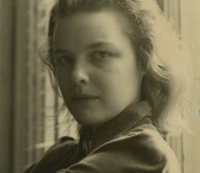
One Morganatic Leer
You think you complain
of the ugliness of people.
Meet your own bed.
Smell what you said.
Your words, unmitigated, dead,
Sink like a noon sun in the crass tomb
beneath the steeple.
Two feet above the sand,
look down
A tartan shore,
A clan, a clack, a whore,
A mobile open door,
To the dog against the tree,
the brittle mugging clown.
Claws like tumbled fingers here
Stand for hands,
Elastic bands,
Minds and trends.
Thighs sprout here enough to breed
the honor of your morganatic leer.
Joan Murray
(1917-1942)
One Morganatic Leer
from: Poems (1947)
• fleursdumal.nl magazine
More in: Archive M-N, Archive M-N, Joan Murray
Thank you for reading Fleurs du Mal - magazine for art & literature